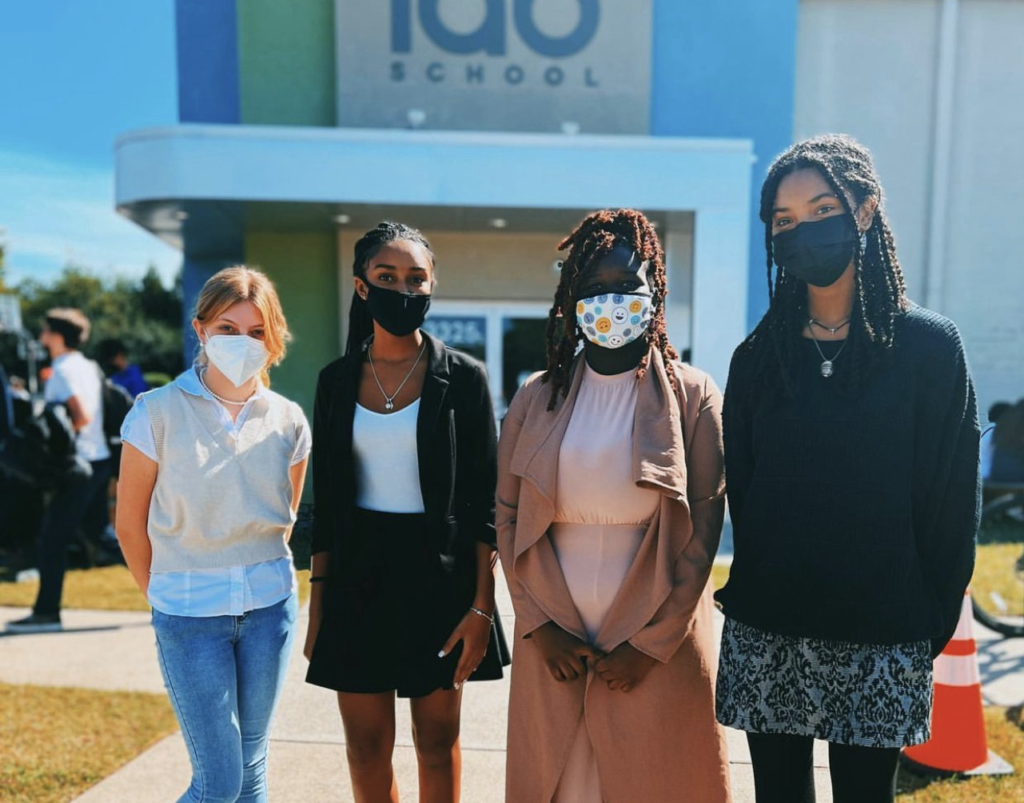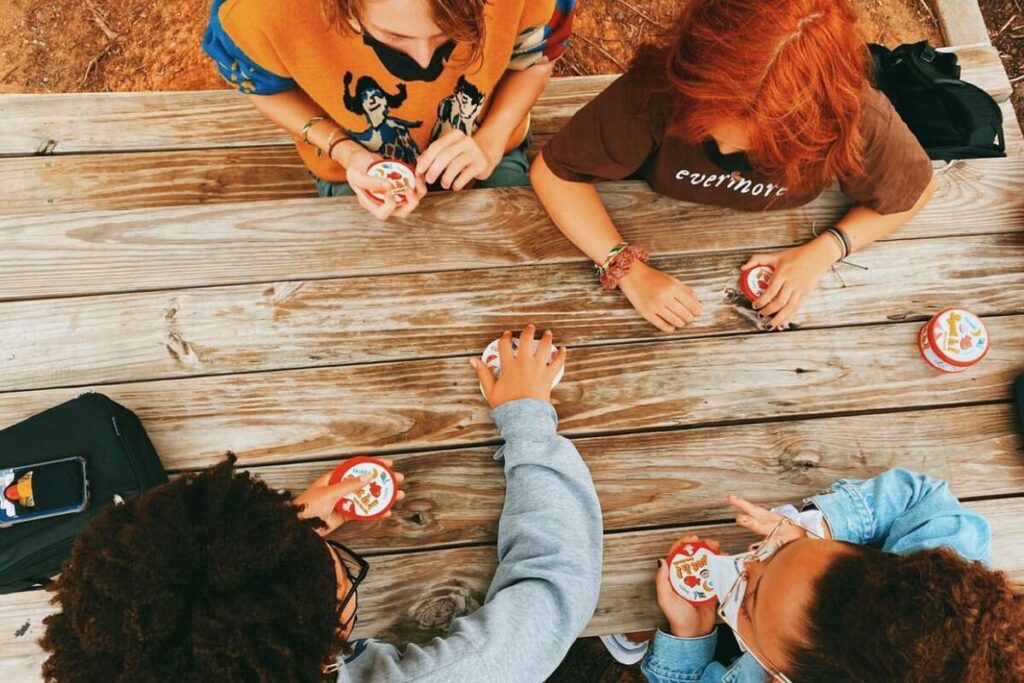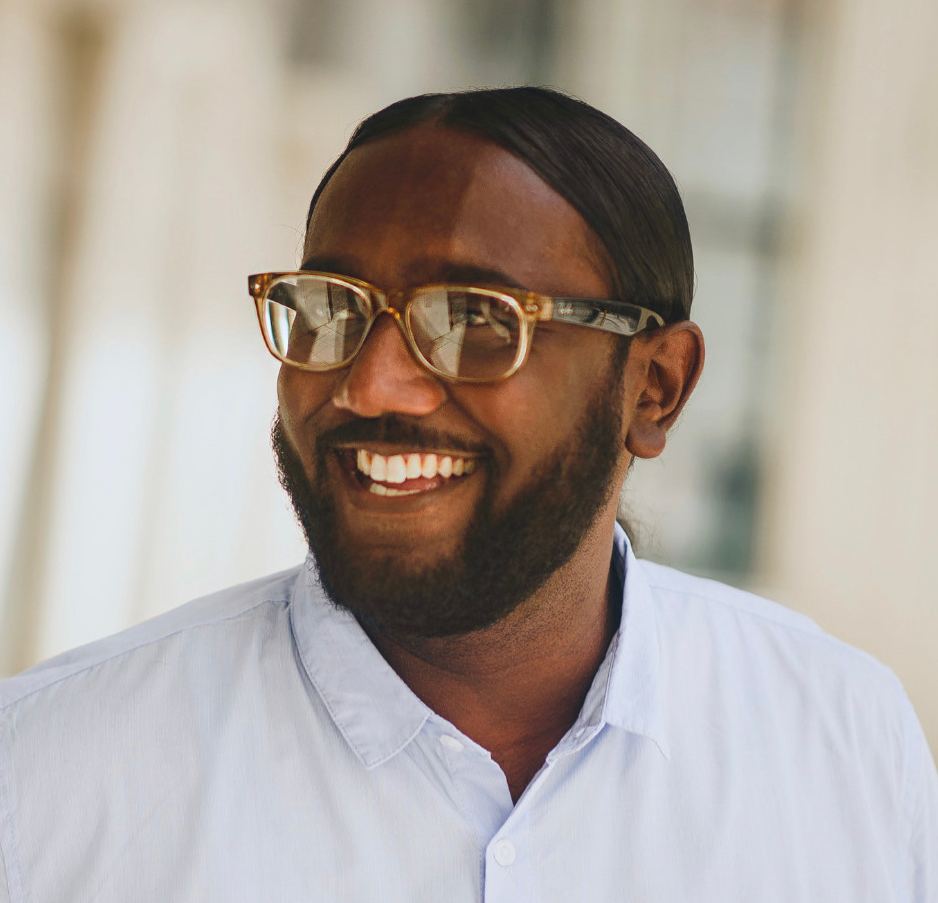I’m so used to not just being a student but actually being seen as a human, a whole person, at school. Instead of just being someone who’s there, someone who just exists, at Lab, it feels like people see you as a whole person.
Branson Flynn, Student
We sat down with Ricky Singh, Head of Upper School; Mrs. Moseley, educator; and five learners (Gabrielle, Charlie, Tre, Journey, and Branson) from Charlotte Lab. Located in Charlotte, NC and launched in 2015, Charlotte Lab was created to reimagine what’s possible in public education. As quoted on their website, “We knew there was a better way to approach school — a way that puts the needs of students (vs. the ‘system’) at the center, a way that lets teachers be the kind of teachers they always thought they could be, a way that proves ALL kids should be known, have opportunities to find and develop their passion, and can be successful.”
Q: What does it look like to go to a school where learner needs are at the center, not the system or the adults? Tell us a little bit about your learning environment and experiences at Lab.
Charlie: At my other schools, there were so many students and not enough teachers. It made it feel like the teachers had to focus on all the students at once. Whereas at Lab, the ratio is a lot better. I get connections with my teachers. If I need one-on-one help, I can easily get it. On top of that, the learning style is different. At other schools, they kind of regurgitated information at you. It was all packets and tests and a crazy workload, just the same thing everyone else did at the same time.
At Lab, the learning style is personalized for me. I learn the way that I want. I take notes the way that works for me, I take on projects I want to, and I can learn in ways that make sense for me.
Gabby: I like going to Charlotte Lab. This was the first school I went to when I moved to America. It feels so open, and I have relationships with teachers that you might not get at the big public schools. I think that’s important for me because I’m a very closed-off person sometimes. It means a lot to have my teachers care about me and want me to be aware of everything happening. We’re all kind of like a family because we’re so small but big at the same time. Everybody knows each other, and we all feel safe at Charlotte Lab. Everybody has their own individual relationships with their teachers.
Journey: I came to Lab during 5th grade and left for a different high school. I went to a public magnet school my freshman year but then returned to Lab for 10th grade. I came back because I felt like, honestly, I had never left. Last year, my old school got out two weeks before Lab did for the summer. So at the end of the year, I came back to Lab for the last two weeks of school and just hung out with all my old friends and teachers. I saw how different the teaching style was and how different it was from my old school. It wasn’t until I went to a more typical school that I realized how different Lab was and that it is how I am meant to learn. This is the right fit for me. It feels so inclusive.
I’ve always been an outspoken and expressive person. In my old school, that was seen as bad. Here, it is like my voice and opinion matter, which means a lot. It makes me feel like they’re allowing me to do something I wouldn’t normally be able to do.
A lot of my friends who go to different schools are not very outspoken. They won’t ask for things in public. I always have to speak before them. It makes me see how much Lab has helped me with using my voice in meaningful ways. I see it even in other forms of communicating my ideas, like emailing, internships, and working with professionals.
Branson: I’ve been here since 4th grade and was in the founding class. Lab has been my main schooling experience for most of my life because before that, I went to another school for 1st and 2nd grade, and then I was homeschooled for a year. I’ve considered looking at other schools, but they just wouldn’t be a good fit for me. I’m so used to not just being a student but being seen as a human, a whole person, at school. Instead of just being someone who’s there, someone who just exists, at Lab, it feels like there is a lot more to how people see you.
I think part of that is the connection with my teachers but also the fact that we can influence what we do and what happens at Lab. Take, for example, my current Quest. It’s called “Making It,” and we got to rebuild a part of the outdoor space to be more of a common area for learners. It’s a real project that somebody will benefit from and something that I can see when I walk in every day. It feels like I have an impact at the school. [Quest is Lab’s approach to challenge-based learning that blends elements from project-based learning, internships, experiential learning, and community-based projects. It asks students to deeply investigate a topic or idea and then apply that set of knowledge and skills to tackle an authentic challenge in their community.]
Trey: I was a part of the original founding class, as well, and have been here since the 4th grade. I have an auditory processing disorder, and I still kind of struggle with it. Before coming here, I went to a different elementary school, and they didn’t really help me with this very much. They have more time, or they make time, to advocate for their students and their needs. They’ve helped me with my speech therapist, with my IEP (Individualized Educational Plan), with a lot of things. I feel like that’s kind of what their top priority is. They’re not just teachers as educators but teachers as adults — as people who are supposed to, you know, provide for your needs.
I recently received the Charlotte 20 Under 20 award, took an AP class, and have been playing shows around the city. I’m a musician and play the guitar, keyboard, and sing. I share this not to brag, but because I attribute a lot of that success to Lab and how the teachers have focused on helping my individual growth. They also care not only about helping me with my academics and auditory processing but also supporting me with my interests. We are always encouraged to explore new interests and ideas. They care about these interests and who we are.
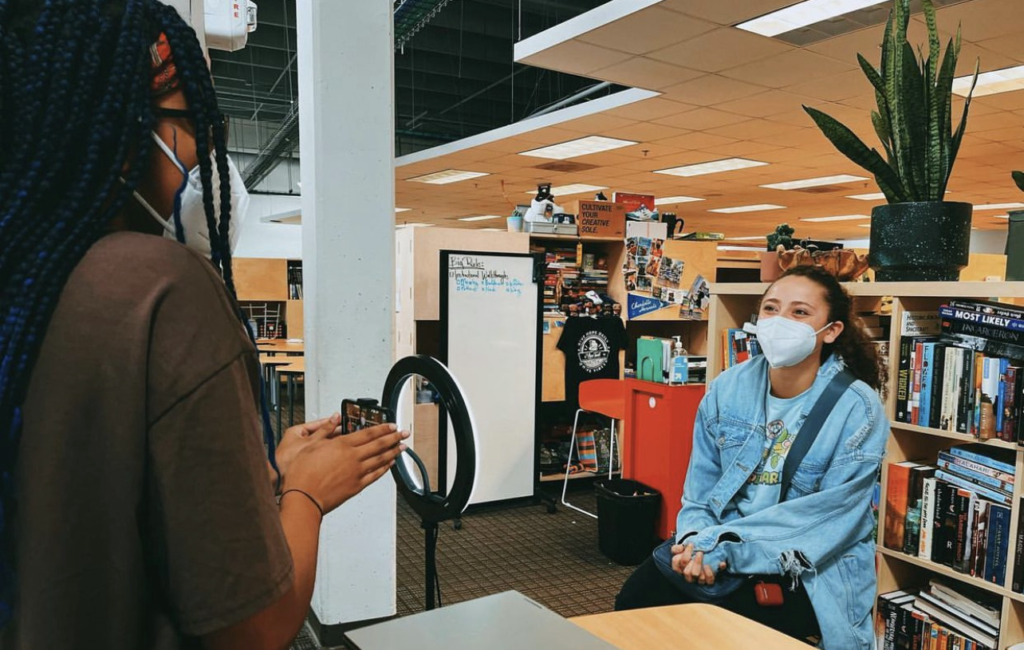
Q: Learners at Lab do a lot of work out in the community — at internships, exploring and creating. Tell us about something you’ve done in the community or a project that has been a part of your Lab experience and why those experiences matter to you.
Ricky (Head of School at Lab): I want to jump in really quick and give some context. We have about 180 youth in our building. You’ll hear from each of these learners about one of their passion projects, a project of high-interest tied to learning goals and outcomes, which we start in middle school.
After learners complete their passion project, we then try to elevate it and create more opportunities based on that passion. This extends into their high school experience. Learners sometimes stick with one passion or move on to something else that they are interested in. We try to match them with meaningful internships that align with those interests.
Gabby: I’ve worked a lot with someone named Ms. Pattlove. She works in the theater here locally, and I was her social media intern. I’d go with her and other classes on field trips to take pictures or visit when other students were making pop-up shops for their projects.
I got a lot of tips from her about marketing the work in a formal and more business-like way. She talked to me about tone and style. It was really helpful because I had to make sure I edited my work, that it was neat, and that I was advertising correctly. It was also a challenge to think through how to get people’s attention.
I also sell my own products at my business called Gabby’s Body Bar — things like body scrubs, lip balm, that kind of stuff. I’ve done that for years, but this internship helped me think even more about my business. All of this started because of our Passion Projects.
Branson: I’m in an internship with VS America, which is a big furniture company. We get to redesign one big area at Charlotte Lab called the Media Lab to be an indoor common space that anyone can use. A couple of weeks ago, we submitted our final design for the space, and now we’re waiting on VS to send us the approval and materials. I’ve never done anything like that in school before, so that’s pretty cool.
At Lab, through these projects, you’re learning things like communication, design, and other skills that will help you in life. On this project, it is so much collaboration and working with other people. I’m working with five other people on this, and we all communicate with each other and give each other ideas. We also got to tour VS America’s location and see what products they had that we could use. We then put our brains together to work on creating this space. That is just one example of the kind of projects we do at Lab!
Charlie: The projects and Quests at Charlotte Lab are so immersive. We learn so much through hands-on activities, and it’s honestly one of the reasons I like it so much. I feel like, for me, it’s a better learning style.
All of the different opportunities to get out in the city and work with other people, I don’t feel like other schools have that. You get to explore new hobbies or passions — something that you’re genuinely interested in.
My Quest this semester is about public art. I like to paint and draw and do things like that, so basically, I make a bunch of different art pieces and then at the end of the class, we will have a pop-up shop.
One thing that I really love about working at Lab is that the kids are the ones that drive the learning. We start with a topic, but depending on how the conversation goes, they’re the ones leading the conversation.
Mrs. Moseley, Upper School English Language Arts Educator
Q: For you Mrs. Moseley, what is it like to be an educator at Charlotte Lab?
Mrs. Moseley: One thing I really love about working at Lab is that the kids are the ones that drive the learning. We start with a topic, but they’re the ones leading the conversation. Each conversation really depends on the turns the class decides to take.
Student voice and agency aren’t these one-off values that educators are supposed to occasionally try to teach, and at Lab, they are built into the curriculum and in every aspect of how we operate. Everything, whether it is a learner getting an internship, speaking to other people, or just engaging in the classroom, they are the drivers.
I know it is different because I taught at a more conventional school before being here. I felt constantly reprimanded and didn’t have autonomy to pay attention to the young people, where they wanted to go, or where they wanted to lead. At Lab, it is the opposite. I feel supported and supported to let learners go and be more of a guide of their learning, which is how I know it should be. As an educator at Lab, I’m more able to craft an environment where learners can get into deep conversations, be vulnerable with their thoughts and ideas, and ask hard questions. They don’t shy away from it.
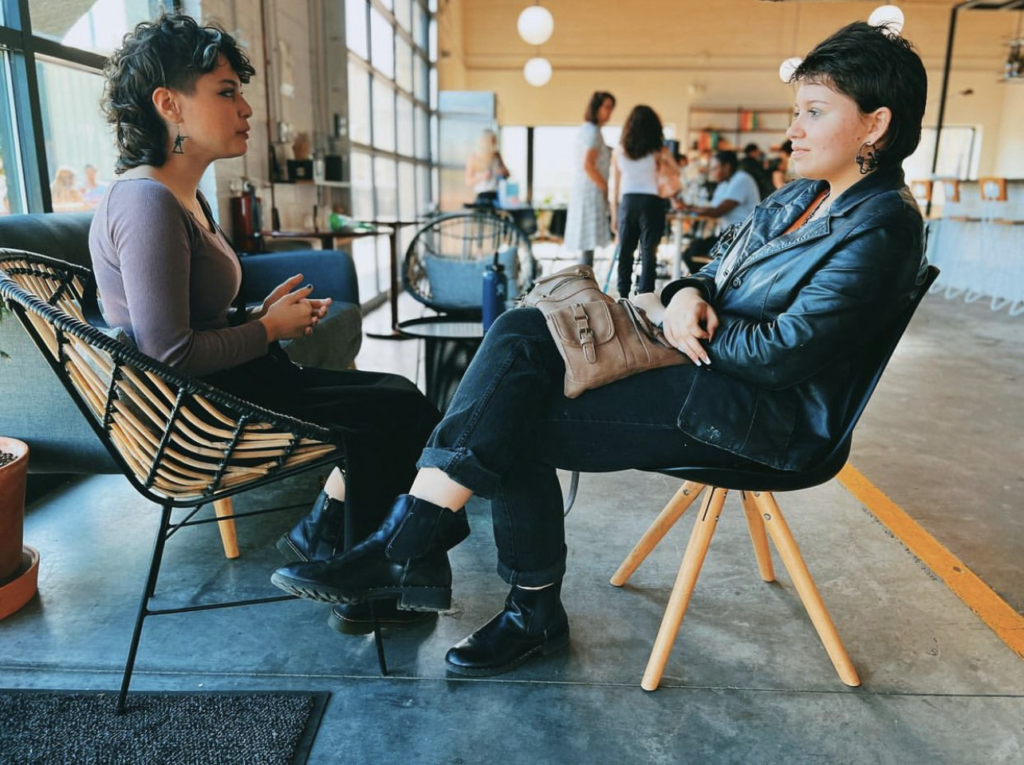
Also, in Advisory, we encourage learners to change the world and be better people, to work with one another, and to PLAY and create JOY. Many of us have forgotten that learning can also be about play and loving what you do. In Advisory, I tell learners whatever they do, especially when we talk about college and career, go do something that you’re going to love.
At Lab, there is a different culture, a different environment. There’s opportunity at Lab. I think that word “opportunity” is really important. For our learners, no matter what level they’re at, no matter their age, their race, there’s always opportunity. There’s acknowledgment and encouragement to grow and to see beyond.
I think that is something that makes Lab very different from conventional schools, where you have to abide by all these rules and hit all these markers. At Lab, it’s not about the markers just for their sake. We want all learners to succeed, yes, but it is more about: What does it look like to change the world? What does it look like to change the style of how we learn?
Q: What advice would you give educators working with young people?
Gabby: Definitely consider the students’ opinions and thoughts when you’re proposing ideas and making decisions for the school. For example, at Charlotte Lab, when we made our schedule, they took our opinions and considerations into it and redid our whole entire schedule to incorporate our feedback. I definitely think if you take students’ opinions and thoughts into consideration, the school becomes a better environment.
Branson: Treat students with respect. The adults at Charlotte Lab treat us with respect and they listen to us. It’s about what we want to do. They support us and let us make our own decisions. I think that is important to share, and I wish more students would have that experience.
Journey: When I was at my previous school, my relationship with my teachers was them just telling me what to do. They gave me information and I did it.
My relationship with the teachers at Lab is honestly the best relationship I’ve had. You are actually able to talk to teachers and ask them questions without feeling like you’re being judged. They are here for you and your growth. I have a lot of respect for them. If you have questions or you’re feeling down or you just need someone to talk to, they’re there.
So, my advice for educators is to create meaningful relationships with learners. Listen to them and actually get to know them.
